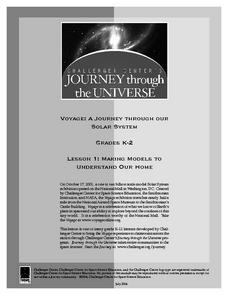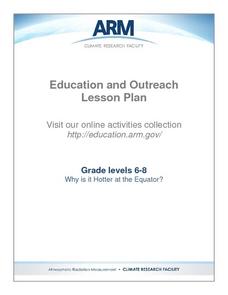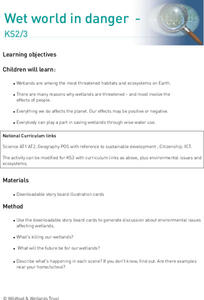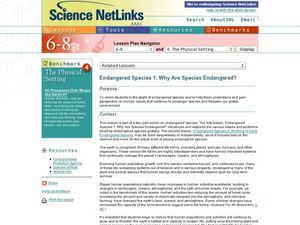Curated OER
Making Models To Understand Our Home
Learners investigate the concept of a model and how it is used to represent something that is real. They recognize how the model can be applied to other types of concepts like the solar system. Students create a scale drawing of a house...
Curated OER
Water and Ice
Students investigate how water goes from a solid to a liquid then back again. In this experimental lesson students conduct their own experiment and see how water changes form.
University of Colorado
Phases of Charon
Charon, the largest of Pluto's moons, was discovered in 1978. Lesson is a walk through of how to solve for the phases of Charon. It uses two different points on Pluto and takes into account the tilt of the pole, the rotational axis, and...
Curated OER
Why Is It Hotter At the Equator?
Students investigate the different heating effects of sunlight. They conduct an experiment that demonstrates the way sunlight strikes the equator, the poles and other parts of the globe.
Curated OER
Location
Students explore the tools used by Columbus to chart his latitude. They study the change of a location over time.
Curated OER
Wet World in Danger
Students investigate the reasons why wetlands are threatened especially by people. They study the wise use of water to preserve wetlands.
Curated OER
Bugs, Bugs, Everywhere!
Students collect and compare bugs using magnifying lenses and graph data based on their comparisons. In this bugs lesson plan, students also make an aspirator by using a jar, tubing, and screen.
Curated OER
Designing an Ecologically Sound City
Fifth graders design an "ecologically sound" city. They write laws for the city to help make all citizens aware of their ecological responsibilities and propose alternative power sources for light and heat.
Curated OER
Air Quality Issues
Students identify the different layers of the atmosphere. They examine the different types of air pollutants. They also discover laws in effect that work to protect the environment.
Curated OER
Making Numbers Manageable
Eighth graders recognize and express numbers when written in time saving techniques. They gather data from a variety of sources, including print and electronic media. They develop a presentation using a variety of techniques.
Curated OER
Sky Watching
Students complete night-sky observations to understand how our knowledge of the sky has been enhanced by telescopes. Students complete a timeline worksheet giving the history of telescopes. Students then then make their own observations...
Curated OER
Perspectives on Animals
Engage your class in a discussion about humane treatment of animals by recognizing the basic rights of all races, religions, classes, etc. Have volunteers stand on a milk crate without shoes until they become uncomfortable as an example...
Curated OER
Was Kepler Correct?
Students are introduced to Kepler's 2nd law of Planetary Motion. The instructional activity reinforces the understanding of focal points. They calculate the sector area of an ellipse.Students expand understanding by modeling Kepler's 2nd...
Curated OER
Worksheet 24 Spring 1996
In this math worksheet, students find all the vectors in three dimensional space that have the length of 4. Also, the first and third components are the same. Finally, the second component is the sum of the first and third components.
Curated OER
Water and Ice
Students participate in various air experiments to understand that air is all around us. In this states of matter lesson, students focus on the role of air in the water cycle. Students understand that air is densest near the ground....
Curated OER
Potential Consequences of Climate Variability and Change
Students examine the potential impact of climate change to agriculture, coastal areas, forests, water, and human health. They hypothesize what might happen to a sugar maple forest and hold a debate about global warming.
Curated OER
Identifying Minerals
Learners compare and constrast a wide variety of minerals and rocks. They test them for streak, luster, color and other characteristics. They view an exhibit and compare their answers to them.
Curated OER
Endangered Species 1: Why are Species Endangered?
Emerging ecologists examine endangered species by visiting the US Environmental Protection Agency website. They consider human contribution to the decline of different species. They research an endangered animal and then craft a poster...
Curated OER
Lunar Myths
Fourth graders explore the phases of the moon. In this moon lesson, 4th graders research myths regarding the moon and create a PowerPoint presentation to share their findings.
Curated OER
HABITAT for the other 90%
Learners examine the connection between the habitat needs of endemic species to the habitat needs of humans. In this habitat lesson learners research the habitat requirements of a given family then develop an idea to improve the habitat...
Virginia Department of Education
Hurricanes: An Environmental Concern
Hurricanes, typhoons, and tropical cyclones are the same type of storm, but their names change based on where they happen. Scholars use a computer simulation to learn about hurricanes. Then they hypothesize ideas to prevent hurricanes...
Curated OER
Lesson 4 Activity 1: Mapping the Third Dimension
Students work in pairs to construct a simple stereoscope.
Curated OER
Bio-What
Learners explore the concept of biodiversity. Through activities, they discover the importance of one species upon another. Students examine food webs, discuss animals interdependence upon one another, and brainstorm why biodiversity is...
Other popular searches
- Planet Earth Dvd Series
- Planet Earth and Bbc
- Planet Earth Seasons
- Planet Earth and Beyond
- Bbc's Planet Earth
- Planet Earth Dvd
- Bbc Planet Earth
- Planet Earth Ocean
- Extreme Planet Earth
- Planet Earth Great Plains
- The Planet Earth
- Planet Earth Jungles

























